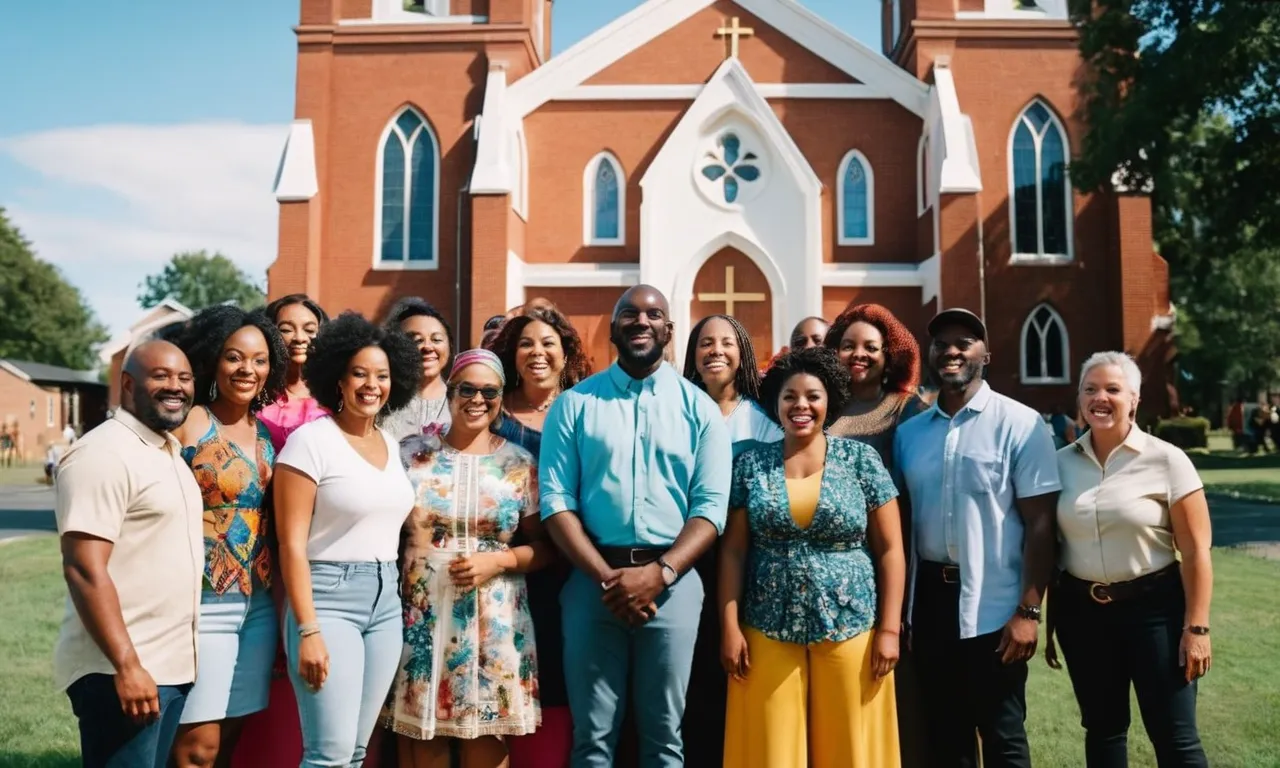What Does The Bible Say About Inclusion?
The Bible has a lot to say about including those who are marginalized in society. Jesus himself spent much of his time with outcasts and those rejected by the religious establishment of his day. As followers of Christ, the Bible calls us to embrace diversity and welcome all people into God’s kingdom.
If you’re short on time, here’s a quick answer: The Bible encourages the full inclusion of all people regardless of ethnicity, gender, age, ability, or background. Key passages emphasize God’s special concern for the marginalized and our responsibility to care for the vulnerable.
Old Testament Passages on Embracing Outsiders
Ruth: A Foreign Woman Joins God’s People
The Old Testament book of Ruth tells the story of Ruth, a Moabite woman who married an Israelite and later converted to Judaism after her husband’s death. As a foreigner, Ruth was an outsider to the Jewish people. However, she was welcomed and embraced by her Israelite mother-in-law Naomi.
Ruth’s story illustrates God’s inclusive love that crosses ethnic boundaries. Ruth declared to Naomi, “Your people will be my people and your God my God” (Ruth 1:16). She was welcomed into the community of Bethlehem and even became the great-grandmother of King David.
Ruth’s embrace by the Israelites foreshadowed the future inclusion of Gentiles into the family of God. Her story reminds us that in God’s kingdom, outsiders can become insiders by faith.
Isaiah: God Welcomes Foreigners and Eunuchs
The prophet Isaiah declared that God’s house will become “a house of prayer for all nations” (Isaiah 56:7). God welcomes foreigners who commit themselves to Him.
Isaiah also stated that eunuchs would be accepted by God, though the Mosaic law excluded them from full participation in Israel’s worship (Deuteronomy 23:1). But God declares, “To the eunuchs…I will give them an everlasting name that will endure forever” (Isaiah 56:4-5).
These radical statements pushed against barriers that excluded outsiders. God’s inclusive salvation extends beyond the expected boundaries of Israel.
The Prophets Call for Social Justice
Many prophets spoke out against oppression and injustice, calling the people of God to care for the poor and marginalized.
For example, Amos condemned those who “trample on the poor” (Amos 2:7). He called for justice to “roll on like a river” (Amos 5:24). Micah reminded the people to “act justly and to love mercy” (Micah 6:8).
These stances align with God’s character as a defender of the vulnerable. The prophets make clear that true devotion to God involves fighting for the rights and dignity of all people, especially the oppressed.
Jesus’ Ministry as a Model of Inclusion
Jesus Reaches Out to Women
In the time of Jesus, women were often marginalized and treated as second-class citizens. However, Jesus’ ministry challenged these social norms by affirming the dignity and worth of women. On several occasions, Jesus engaged with women in public ministry, countering the patriarchal views of his day (Luke 8:1-3).
For instance, Jesus had women followers who traveled with him and provided financial support for his ministry. This was unheard of at the time!
Jesus also ministered to socially ostracized women, such as the Samaritan woman at the well (John 4:1-42). By speaking with her and offering her living water, Jesus crossed cultural and ethnic boundaries to extend love and redemption.
Though she had a morally questionable background, Jesus offered her dignity and community. The woman eventually brought many Samaritans to faith in Jesus. This affirms that Jesus’ gospel is for all people, regardless of gender, social status, or ethnicity.
Jesus Affirms Outcasts and Foreigners
In addition to women, Jesus’ ministry embraced those marginalized in society like the poor, sick, and socially unclean. Jesus touched lepers (Luke 5:12-16), healed the blind (John 9:1-12), and welcomed children (Luke 18:15-17) who had low social status.
He also defended a sinful woman who anointed his feet from condemnation (Luke 7:36-50). Through his healing ministry and defense of outcasts, Jesus revealed that the margins are exactly where God’s redemptive love is at work.
Furthermore, Jesus praised outsiders like the Good Samaritan (Luke 10:25-37) and Roman centurion (Luke 7:1-10) for their faith. Though they were foreigners and Gentiles, Jesus commended their belief in him. He sternly warned against excluding “outsiders” from the kingdom of God (Luke 13:22-30).
For Jesus, God’s salvation was for all peoples – insiders and outsiders alike.
The Disciples Struggle with Exclusivity
Despite Jesus’ example of radical inclusion, the disciples repeatedly tried to restrict access to Jesus and his ministry. For instance, they rebuked people bringing children to Jesus (Luke 18:15-17). Other times, they wanted to send away the crowds (Mark 6:31-44) or limit Jesus’ ministry to Israel alone (Matthew 15:21-28).
They viewed outsiders and outcasts with suspicion rather than compassion.
Jesus consistently corrected his disciples’ exclusionary attitudes. He sternly told them not to prevent children from coming to him and famously said: “Let the little children come to me.” (Luke 18:16).
Through his words and actions, Jesus made it clear that the gospel was for all people – regardless of ethnicity, social status, or reputation. His ministry on earth modeled the boundless love and grace of God.
New Testament Directives on Welcome and Accommodation
Book of Acts: Racial Barriers are Removed
The Book of Acts shows how the early church welcomed people of all backgrounds into the Christian faith. When Peter visits the home of the Roman centurion Cornelius, he states, “I now realize how true it is that God does not show favoritism but accepts men from every nation who fear him and do what is right” (Acts 10:34-35).
This signals that the gospel is open to Gentiles from all nations, not only Jews. Later, some Jewish believers insist that Gentile converts must adhere to Jewish law and customs, but the Council of Jerusalem rejects this in a revolutionary policy change (Acts 15).
The New Testament community breaks down barriers and affirms that the grace of Christ is available to all.
Galatians: No Distinction Between Ethnic Groups
Paul’s letter to the Galatians also stresses unity in diversity. He writes, “There is neither Jew nor Gentile, neither slave nor free, nor is there male and female, for you are all one in Christ Jesus” (Galatians 3:28). Every type of human distinction is transcended in Christ.
He reiterates this is Galatians 6:10, urging, “as we have opportunity, let us work for the good of all people.” True Christianity must be radically inclusive.
James: True Religion Cares for the Vulnerable
Finally, the letter of James defines authentic religious devotion as caring for vulnerable groups who are often excluded or oppressed: “Religion that God our Father accepts as pure and faultless is this: to look after orphans and widows in their distress and to keep oneself from being polluted by the world” (James 1:27).
By singling out vulnerable groups like orphans and widows, James makes exceptionally clear that following Jesus means showing compassionate care and inclusion to those frequently marginalized or maltreated in the first century: the poor, sick, disabled, women, strangers, prisoners (or widows and orphans).
Conclusion
The Bible contains a consistent message calling God’s people to advocate for the marginalized and extend welcome to people of all backgrounds. Scripture urges us to look beyond surface differences to see all people as made in God’s image and valued members of Christ’s body.








